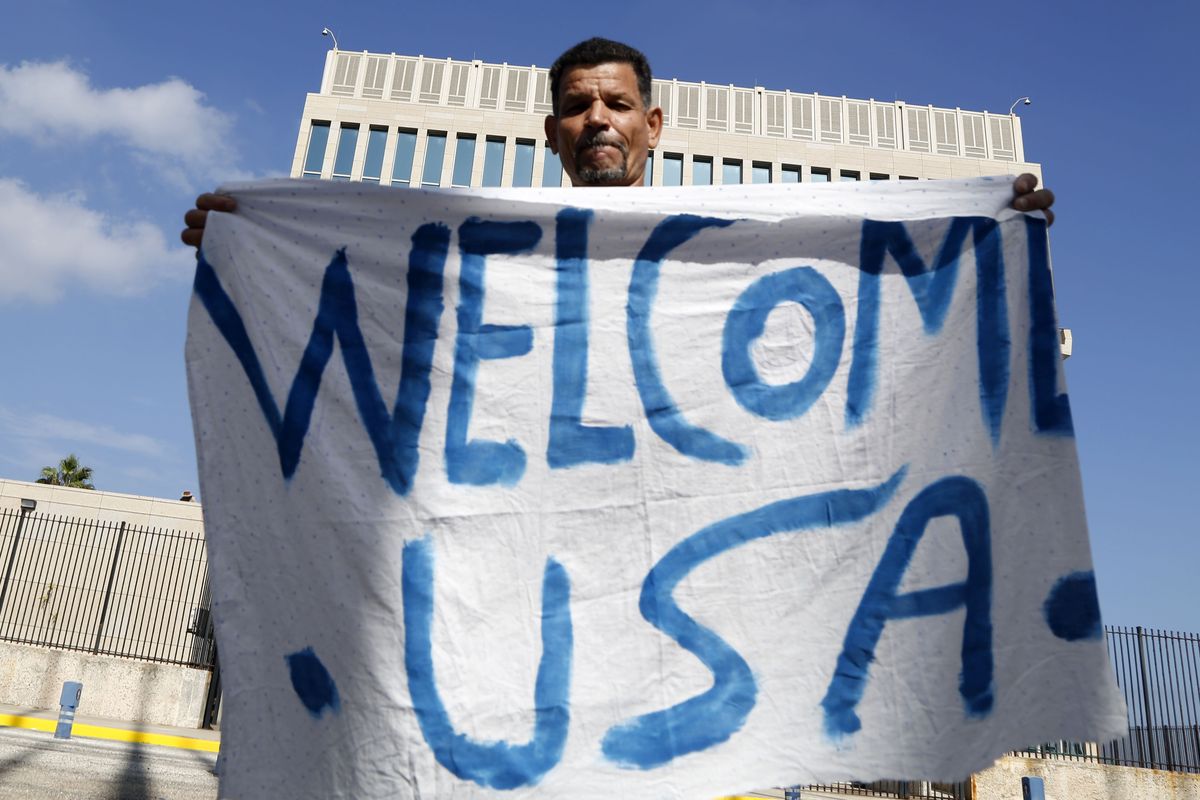Mixed response to opening of Cuba
Sharp divisions, tears mark landmark day

WASHINGTON – At the news conference Monday with Secretary of State John Kerry and his Cuban counterpart, Bruno Rodriguez, the first Cuban foreign minister to visit Washington since 1958, audience members marveled at the sight of the two nations’ flags displayed together, snickered at Kerry’s Spanish pronunciation and raised their smartphones in the air to capture the historic moment.
Behind the scenes, however, the official thaw after five decades of frozen diplomacy was messy. As the visiting Cuban journalists filed out of an ornate hall at the State Department, an anti-Castro activist reporter made a few loud remarks about the state-run media delegates and put his hand over his mouth to mock how they’re censored by Havana. The state-backed journalists rolled their eyes in response.
Then they were all shepherded into the same freight elevator, opposition and pro-government journalists, eye-to-eye and silent, for an awkward ride up to the first floor, where they could exit and begin writing their very different accounts of a landmark day.
That tension was what was left after the diplomatic niceties and linguistic exchanges, emblematic of the fraught conversations ahead – among Americans, among Cubans, and between Cubans and Americans – on the path to full normalization of relations.
“Cuban democracy, like heaven, can wait,” said Orlando Luis Pardo, the opposition activist and writer who needled his fellow Cubans from state media. But, he added: “We’re still happy with this opening, of course.”
That two-pronged response, the disdain for the Cuban government’s human rights record coupled with the promise of restored relations with the United States, was echoed throughout the day wherever Cubans gathered in Washington. Among Cubans and Cuban Americans, sharp divisions linger over the Obama administration’s latest diplomatic feat, shaped in part by age, ideology and personal experience.
Those fractures were on plain display Monday morning as dozens of Cubans, vastly outnumbered by international media, gathered to watch a Cuban honor guard raise the flag outside Havana’s embassy in Washington. Whether out of heartbreak or happiness, many had tears in their eyes.
Some said they wept for this sign of a fresh start, perhaps, toward greater freedoms and economic opportunity on the island. Others said their tears were for the imprisoned dissidents the Castro regime still holds, and for the ordinary Cubans whose dreams have been crushed under communism.
“The only happy day will be when communism is gone from Cuba,” said Maria Casanova, who fled to the United States during the Carter administration as soon as her husband, now 82, was released after spending “20 years, one month and 19 days” as a political prisoner.
A more recent arrival from Cuba had a softer stance. Tiare Trelles, 27 and three months pregnant, said she’s been in the United States for just a year after escaping via Mexico and obtaining political asylum. She choked up when describing the mixed feelings she had in watching the Cuban flag return to the United States.
Trelles said she was thinking of her family in Havana and the financial hardships that will continue despite relations with the United States. As a sales clerk at a Macy’s in Maryland, Trelles said, she already makes far more than the $20 a month she earned in Cuba as an industrial designer, a member of the professional class.
But she was also thinking of her unborn baby, who will be a U.S. citizen, and said she wants her child to grow up in a new era of cooperation and exchange.
“I will give my baby everything Cuban – the food, the dances, the culture, all the good parts,” Trelles said. “I want him or her to know what good people we are, and I want Americans to know that, too. This is an opening, a good opportunity for both countries.”
After the flag-raising ceremony, three friends from Miami who now live in Washington gathered at a local Cuban cafe to escape the heat and reflect on the day. Maria Korge, Frank Santamarina and Maria Elena Frederick all came from families who lost property and businesses when the Castros came to power in 1959, and yet they expressed a far more nuanced view of the diplomatic breakthrough than their parents’ generation of exiles.
Korge’s father perished at sea during the Camarioca boat lift of 1965; she was just 2 years old at the time. Santamarina’s father told him of the deeds to the family’s confiscated properties languishing in an old desk back in Havana. And Frederick’s father died five years ago as a naturalized American who “never got over the loss” of his homeland.
“He made a life here and he loved this country, but his heart was always in Cuba,” Frederick said. “When it came time to bury him, I kept his ashes. I said no, ‘I want to spread his ashes on Cuban soil.’ ”
The friends justified their support for deeper U.S.-Cuban ties on many grounds: Decades of the embargo simply hasn’t worked either to overthrow the Castros or ease life for ordinary Cubans. Keeping the embargo in place is hypocritical when China, also communist, is a major U.S. trading partner. And they argued that regime officials only profit from the current arrangement, by siphoning off remittances from Miami, for example.
There’s also what Korge calls the Godfather argument: “Keep your friends close and enemies closer.”
Their logic doesn’t resonate with exiles such as Frederick’s mother, who upon receiving her daughter’s text with photos of Monday’s flag-raising responded with a single word cloaked in sarcasm: “Nice.”